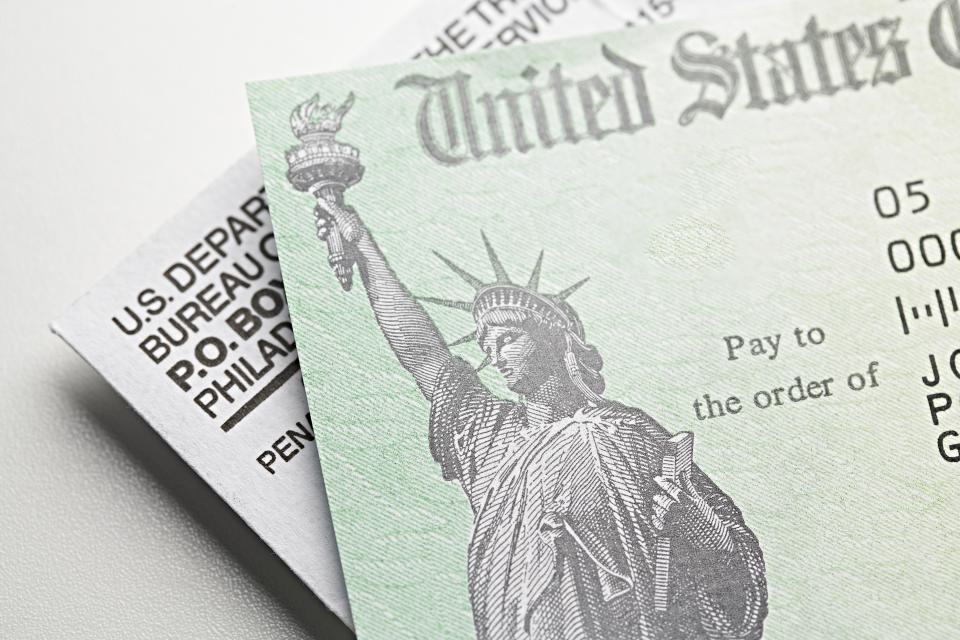If you don't get more stimulus checks this summer from Uncle Sam, here's how the stock market may react
With cities across major states such as California, Florida and Texas returning to some form of lockdown due to spiking COVID-19 cases after brief full re-openings, it’s becoming clear the U.S. economy will likely need a fresh jolt of stimulus from lawmakers.
If that stimulus isn’t received this summer the stock market — which has been blindly rallying despite growing risks of a renewed dive in economic activity because of COVID-19 —could easily fall off a cliff.
“It will be a hit, no question,” warned Belpointe Asset Management chief strategist David Nelson on Yahoo Finance’s The First Trade of the risk to stocks if more stimulus isn’t enacted. Other pros Yahoo Finance has chatted up estimate the stock market could plunge nearly 20% if lawmakers don’t enact additional stimulus.
Under the Coronavirus Aid, Relief, and Economic Security (CARES) Act, individuals were eligible for up to $1,200 (depending on income level) in stimulus checks. Married couples were able to receive up to $2,400. Children under 17 were granted $500. Those checks began hitting bank accounts in mid-April, and helped prop up consumer spending at online retailers and restaurants amidst record levels of unemployment.
Retail sales rose by a hearty 17.7% in May thanks mostly to the stimulus checks.
The checks, of course, helped many households to make ends meet when it comes to essential bills.
Additionally, the CARES Act allowed those unemployed to claim an extra $600 a week in benefits until July 31. The “top-up” has meaningfully supported households during the pandemic. Note that the average unemployment check was around $380 pre-pandemic.
Says Nelson, “A lot of people out there are still struggling from home. One of the biggest risks I see is the commercial real estate market. A lot of companies will not renew their lease. I’m seeing it here in Connecticut. A lot of companies haven’t renewed their leases. In fact, they found out very easily that a lot of their employees could work at home and get the job done. They can get by, unfortunately, with less employees.”
Meanwhile, the $2 trillion CARES Act also set aside hundreds of millions of dollars in forgivable loans to businesses to keep people on the payroll.
“Lawmakers face a series of fiscal cliffs over the next couple of months,” cautioned Goldman Sachs chief economist Jan Hatzius, adding that it’s unlikely Congress agrees to extend the unemployment top up before its July 31 expiration date.
Hatzius is in the minority right now in expecting a bitterly partisan government — about to endure a heated presidential election — to pass more stimulus.

“We continue to expect that Congress will enact another $1.5 trillion (7% of GDP) in fiscal measures. Most of this looks likely to come through the next fiscal bill that Congress enacts, likely in late July or early August. In light of recent policy discussions, we also believe that additional measures might be slightly more front-loaded than we previously assumed, with $800 billion implemented in 2020 (or 3.8% of GDP), versus our previous expectation of $550 billion,” Hatzius says.
If a bridge isn’t built to more fiscal help for consumers and businesses, it will be hard for investors to justify current stock valuations. Those valuations have only gotten frothier in recent months, as the S&P 500’s 20% gain in the second quarter was its best quarterly return since 1998 and fourth highest since 1950 points out SunTrust chief markets strategist Keith Lerner.
Hot tech stocks such as Netflix, Amazon and Tesla also continue to touch new record highs.
“At this time valuations just look a bit too frothy,” said Verdence Capital Advisors director of portfolio strategy Megan Horneman on The First Trade. “So the biggest thing to do right now is be patient. There is nothing wrong with holding some extra cash in your portfolios, especially given the risks that could arise in the summer months. So that’s what we’re doing right now.”
Brian Sozzi is an editor-at-large and co-anchor of The First Trade at Yahoo Finance. Follow Sozzi on Twitter @BrianSozzi and on LinkedIn.
Coca-Cola CEO: here’s what our business looks like right now
Dropbox co-founder: the future of work will be all about this
Follow Yahoo Finance on Twitter, Facebook, Instagram, Flipboard, SmartNews, LinkedIn, YouTube, and reddit.
